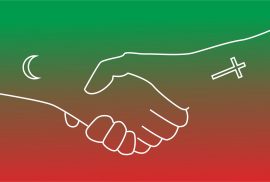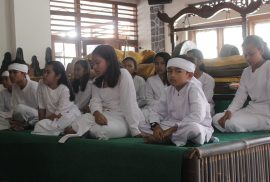Azis Anwar Fachrudin | CRCS | Article
In two consecutive days of this week, the world’s two biggest religions commemorate the birth of their respective “founders”: Islam’s Prophet Muhammad (Maulid) and Christianity’s Jesus Christ (Christmas). This is certainly a rare event that will not happen for dozens of years to come.
In Indonesia, both commemorations have officially been declared national holidays. Indonesia is among most Muslim-majority countries in which Maulid constitutes a national public holiday. It is only in Saudi Arabia and Qatar, out of all Muslim majority countries, where Maulid is not a holiday, probably because of the views of clerics there who regard Maulid celebration as Islamically illegitimate and bid’ah (heretical). Besides, Indonesia is among several Muslim-majority countries that recognize Christmas as a national holiday.
This is a momentous time for both Muslims and Christians to reinforce interfaith dialogue — it probably could be incorporated in the agenda of the commemorations.
For Indonesians in particular, it is worth being grateful that the annually held debate among people at the grassroots — on whether saying “Merry Christmas” to Christians is religiously allowed for Muslims — is coming to an end. Additionally, another annual debate on whether Muslims may celebrate Maulid has generally begun decreasing.
In fact, these two debates on Maulid and Christmas are mostly fueled by Wahhabist views. Across the Muslim world, it is mostly the Wahhabists who claim that saying “Merry Christmas” is tantamount to affirming Christian belief on Jesus’ divinity and as such forbidden.
And why is the debate now not as heated as in the previous years? I heard a satirical comment in social media saying that it is because the Wahhabists are nowadays preoccupied with declaring the Shiites infidels. A plausible explanation! The sense of “feeling threatened” has now been shifted from Christians to Shiites, as well as to communists (whose political party no longer exists).
As for interreligious dialogue, now is a good time to recall and to remind Muslims and Christians of the document, A Common Word Between Us and You, which was launched in 2007. Originally an open letter to the Catholic pope, it has now been signed by hundreds of the world’s leading Muslim scholars and intellectuals (it can be accessed at acommonword.com). The document basically conveys that there are more common grounds for peace between Muslims and Christians than conflicting teachings. The document was then responded to by Loving God and Neighbor Together: A Christian Response to A Common Word, which was initially signed by more than 300 Christian leaders and scholars.
These kinds of documents should be more endorsed by respective leaders, clerics and scholars, for at least two reasons. First because, particularly in Indonesia, the document seems to be less exposed to the public. Second, nowadays we see a rising intolerance in the respective worlds. The rise of Islamophobia in the West, not only in Europe but also in the US given the recent phenomenon of presidential hopeful Donald Trump, is a good example.
On the other side, the Muslim world is now suffering from radicalization, resulting in the emergence of the Islamic State (IS) movement. This is why peace-building and tolerance activists should work harder to win the discourse in the respective worlds, including for example by exposing their respective communities to the documents.
As for the Muslim world, the Maulid commemoration can be a good time to reread the Prophet’s biography, not only to praise or glorify him but also to deal with how we should understand his having been a leader of wars in today’s context. Around the globe, Muslims usually celebrate Maulid by reciting salawat (prayers) or madah nabawi (a kind of eulogy to praise the prophet). In Indonesia particularly, Muslims recite books containing Arabic poetry of salawat or madah nabawi.
I think that in today’s context such a reading of the Prophet’s biography, while good, should be furthered with rereading about the violence surrounding his life. This is important because some Muslims who do violence nowadays quite often justify their acts by citing examples of the violence commanded by the prophet.
Prophet Muhammad, unlike Jesus, was a leader in war. He was involved in nine wars. Furthermore, he dispatched military expeditions at least 38 times. Some early biographers of the Prophet emphasized this aspect; this is why their books were entitled Maghazi (literally “wars”) and it became a genre of biography at the time. All these wars left hundreds of victims and happened during eight years from 2 AH to 9 AH, a period in the last phase of Muhammad’s prophetic ministry when Muslims became quite powerful.
How then should today’s Muslims read those wars led by the Prophet? This has very much to do with Islamic jus ad bellum, especially on what circumstances violence can be justified under Islamic teachings. Rereading these, I think, is more important as a counter interpretation of violent Muslims rather than saying normatively that “Islam is a religion of peace” or that “rahmatan lil-‘alamin” (“the prophet was sent as a mercy for all creatures”).
religious freedom
Fardan Mahmudatul Imamah | CRCS | SPK

Diskriminasi terhadap masyarakat adat, penghayat, dan penganut kepercayaan hingga saat ini masih berlangsung di Indonesia. Meskipun demikian, Sunda Wiwitan sebagai salah satu agama lokal Sunda terus memperjuangkan hak-haknya sebagai warganegara. Masyarakat Sunda Wiwitan tidak hanya melakukan upaya demi terpenuhinya hak-hak sipil mereka, tetapi juga—bersama komunitas lain di sekitarnya—melawan eksploitasi sumber panas bumi di Gunung Ciremai oleh PT. Chevron Geothermal Indonesia. Dua hal tersebut menjadi tema utama diskusi peserta Sekolah Pengelolaan Keragaman (SPK) VII dengan masyarakat Sunda Wiwitan Cigugur, Kuningan, Jawa Barat, Sabtu 28 November 2015.
Pangeran Djati Kusumah, pimpinan masyarakat Sunda Wiwitan, mengatakan banyak orang yang tidak mengerti dan tidak mengetahui Sunda Wiwitan, termasuk keterlibatan mereka dalam perjuangan kemerdekaan Republik Indonesia. Bagi masyarakat Sunda Wiwitan, adat karuhun Sunda Wiwitan adalah ajaran leluhur Sunda yang menuntun kesadaran spiritual manusia Sunda terhadap kekuatan energi dalam semesta di luar dirinya selaku manusia; sadar pada hukum kepastian-Nya, teguh pada janji menjaga cara ciri manusia dan cara ciri bangsa. Kesadaran itulah yang mendorong mereka untuk terlibat aktif dalam perjuangan kemerdekaan Republik Indonesia di masa penjajahan serta perjuangan menentang eksploitasi sumber panas bumi di masa kemerdekaan ini.

Dalam kesempatan itu pula, Dewi Kanti, salah seorang putri Pangeran Djati Kusumah, menjelaskan masalah diskriminasi terhadap masyarakat Sunda Wiwitan sejak Zaman Belanda. Pada masa pendudukan Belanda, penganut Sunda Wiwitan diisukan sebagai komunitas api atau sempalan Islam, sehingga muncul pertentangan dari pesantren-pesantren. Pangeran Sadewa Alibassa atau dikenal Pengaren Madrais, pimpinan Sunda Wiwitan saat itu, sempat dipenjarakan dengan tuduhan memeras masyarakat dan dianggap gila, sehingga pada tahun 1901–1908 dibuang ke Boven Digul.
Selanjutnya, diskriminasi terkait administrasi sipil dimulai pada masa penjajahan Jepang, dengan berdirinya Shumubu yang saat ini menjadi Kantor Urusan Agama (KUA). Saat itu, masyarakat Sunda Wiwitan tidak dapat melakukan pencatatan pernikahan mereka secara legal karena tidak mengikuti ajaran Islam. Akibatnya, pernikahan masyarakat Sunda Wiwitan mendapatkan stigma “pernikahan liar.” Di masa kemerdekaan, posisi masyarakat Sunda Wiwitan semakin sulit. Pemerintah melalui Badan Koordinasi Pengawasan Aliran dan Kepercayaan (Bakorpakem) yang dibentuk pada 1961, membatasi ritual dan kepercayaan masyarakat Sunda Wiwitan. Oleh karena itu, pada 1964, Pangeran Tedja Buana—putra Pangeran Madrais—menginstruksikan untuk memilih agama dengan simbol “berteduh di bawah cemara putih” guna menyelamatkan komunitasnya dari stigma perkawinan liar.”Sebagian masyarakat Sunda Wiwitan memilih masuk agama Katolik dan Kristen, dan sebagian kecil lainnya masuk ke Islam.
Namun pada 1981, kebijakan Pangeran Tedja Buana tersebut terkendala oleh Misi Gereja Katolik kepada sesepuh adat. Saat itu, acara gereja tidak mengakomodasi tradisi. Pangeran Djati Kusumah, pimpinan Sunda Wiwitan selanjutnya, menyatakan keluar dari Katolik yang kemudian diikuti masyarakat Sunda Wiwitan lainnya. Akibatnya, melalui Bakorpakem, negara melarang segala kegiatan tradisi Sunda Wiwitan, di antaranya Upacara Seren Taun—Syukuran Masyarakat Agraris—selama 17 tahun, dari 1982 hingga 1999.

Dengan berbagai upaya dan peluang untuk terus mempertahankan kepercayaan mereka, masyarakat Sunda Wiwitan membentuk paguyuban dan mendaftarkannya di Kementerian Pendidikan dan Kebudayaan. Meskipun demikian, hal itu tak banyak membantu mengatasi kesulitan administrasi sipil terhadap masyarakat Sunda Wiwitan. Pada proses pembuatan KTP penganut Sunda Wiwitan dianggap tidak beragama, dan kolom agama pun dikosongkan. Selain itu, dalam pembuatan akta kelahiran anak, hanya pihak ibu yang disebutkan, sedangkan bapak ditulis secara administratif sebagai ayah angkat. Siswa penganut Sunda Wiwitan harus menerima ajaran agama lain di sekolah dan sebagian diminta untuk mengikuti kegiatan-kegiatan agama lain. Kesulitan administrasi tersebut berimplikasi pada hak-hak sipil lainnya, seperti pendidikan, pekerjaan dan politik.
Dewi Kanti juga mengatakan, masyarakat Sunda Wiwitan berupaya untuk tetap berkarya dalam menjaga keutuhan tradisi—antara lain melalui produksi ukiran akar dan kayu khas Sunda, batik Sunda, tarian dan lagu-lagu Sunda, serta arsitektur bangunan dengan simbol-simbol Sunda Wiwitan. Selain itu, pihaknya juga berusaha untuk mendokumentasikan praktik pelanggaran konstitusi yang dilakukan oleh aparatur negara terhadap masyarakat Sunda Wiwitan. Bagi masyarakat Sunda Wiwitan, Dewi Kanti berusaha untuk terus meningkatkan daya juang komunitas, penyadaran hak konstitusi, serta penyadaran kewajiban selaku masyarakat bela bangsa.
Lebih lanjut, masyarakat Sunda Wiwitan senantiasa terlibat aktif dalam usaha konservasi lingkungan dan menolak eksploitasi sumber daya panas bumi di lereng Gunung Ciremai. Okki Satria, suami Dewi Kanti, menceritakan bahwa usaha yang dilakukan sejak 2014 tersebut, melalui diskusi dan penguatan komunitas, tidak hanya dilakukan masyarakat Sunda Wiwitan, tetapi juga masyarakat sekitarnya, termasuk Ahmadiyah yang berdekatan dengan lokasi tersebut. Unsur masyarakat meliputi tokoh-tokoh masyarakat, pimpinan agama, pemuda, bahkan ibu-ibu ikut turun ke jalan memperjuangkan isu ini. Aksi penolakan tersebut berhasil mendesak Bupati Kuningan untuk berdiskusi dan mendengarkan keberatan mereka atas eksploitasi tersebut.
(Editor: A.S. Sudjatna)

Author: Ali Ja’far/CRCS
Editor: Gregory Vanderbilt
 “Where religious freedom is heading to” is the big question nowadays. It is sensitive issue in pluralistic societies where blasphemy law and religious conflict are still dominant. Speaking in the Wednesday Forum of CRCS/ICRS, Dr Paul Marshal of the Hudson Institute in Washington, D.C., and the Leimena Institute in Jakarta argued that emphasizing religious freedom does not correlate with religious conflict, but the prevalence of religious restriction does. In his research summary, combining data from more than 180 countries, he showed that there are two factors related to religious conflict: religious restriction and social hostilities.
“Where religious freedom is heading to” is the big question nowadays. It is sensitive issue in pluralistic societies where blasphemy law and religious conflict are still dominant. Speaking in the Wednesday Forum of CRCS/ICRS, Dr Paul Marshal of the Hudson Institute in Washington, D.C., and the Leimena Institute in Jakarta argued that emphasizing religious freedom does not correlate with religious conflict, but the prevalence of religious restriction does. In his research summary, combining data from more than 180 countries, he showed that there are two factors related to religious conflict: religious restriction and social hostilities.

The “Keeping the Faith: A Study of Freedom of Thought, Conscience and Religion in ASEAN” discussion series arrived in Yogyakarta on May 30, 2015. Held in collaboration with HRRC’s partner, the Law Faculty of Gadjah Mada University (UGM), the event was also organized with the support of the Center for Religious and Cross-cultural Studies (CRCS UGM), the Center for Human Rights Studies of the Islamic University of Indonesia (PUSHAM UII), and the Oslo Coalition on Freedom of Religion or Belief at the Norwegian Centre for Human Rights.
Dr. Zainal Abidin Bagir, Director of the Center for Religious and Cross Cultural Studies (CRCS) at Gadjah Mada University and author of the Indonesia country report in “Keeping the Faith,” focused on the country’s freedom of religion situation. “Law both shapes the society and is shaped by the society. Thus, engagement with the society is important to end discrimination and persecution against religious and belief minorities.” Specifically on the Law on Anti-Blasphemy in Indonesia, “there is a need to raise awareness in the society to repeal laws that open the room or pathway toward intolerance,” Dr. Bagir emphasized.
For the whole report of the discussion series click “Keeping the Faith roadshow in Jakarta” and “Keeping the Faith discussion series in Yogyakarta.”




